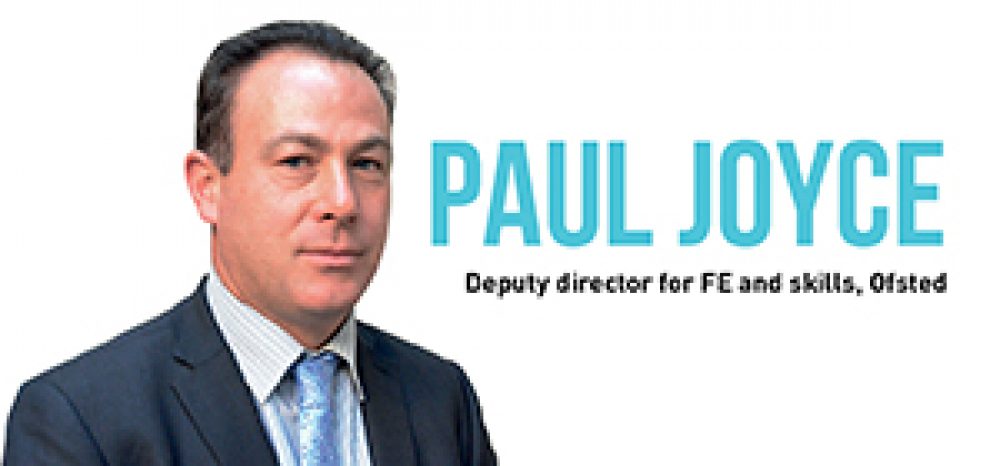Paul Joyce explains what Ofsted inspectors are looking for from traineeships — beyond high quality English and maths provision.
With a greater emphasis being placed on apprenticeships and vocational education, it can sometimes be easy to forget about traineeships and the important role they play in preparing many learners for their next steps.
There is sometimes confusion, therefore, about what Ofsted does and does not expect to see when inspecting traineeships.
As with all education and training, Ofsted inspects traineeships under the Common Inspection Framework.
Inspectors also refer to the detailed guidance contained in the FE and skills handbook.
Their key considerations will include the extent to which well-planned and managed programmes meet the principles and requirements of traineeships, including provision of work-preparation training, English and mathematics, and high-quality work experience.
Also, how well do managers collaborate with employers to ensure all programmes prioritise the skills and attitudes learners will need for work, and whether they ensure provision builds on each learner’s prior achievement and enables them to progress to an apprenticeship, employment or possible further study.
In addition to that, they look into whether work experience is integrated into each traineeship and provides a purposeful and challenging context for learners to develop their skills, including in work-related English and mathematics.
Inspectors also consider whether teaching, learning and assessment enables learners to develop the skills, attitudes and behaviours needed to help them achieve their main learning goals and career aims.
They also look into whether learners progress to an apprenticeship or sustained employment; and acquire the sector-specific skills necessary to enable them to progress to their planned next step.
The primary purpose of a traineeship is to enable students to successfully progress to employment, an apprenticeship, or to a substantive further education programme.
Despite what some have suggested, providers are not judged solely on the quality of English and maths provision
Inspectors always remain mindful of this and will seek reliable evidence from providers that demonstrates how successful the provision is in supporting such progression.
They also check to establish the reliability and accuracy of provider’s progression data by, for example, contacting previous learners or their employers.
This is because we want to know that the learners who progressed to positive destinations continue to be in sustained employment, on an apprenticeship or on a further education course.
We also look at the quality of teaching, learning and assessment that is provided to learners on the programme.
This may include, for example, evaluating how effectively learners develop employability skills such as time-keeping, communication, team-working, problem-solving, or literacy and numeracy skills.
If learners are enrolled on courses that lead to qualifications, inspectors will of course look at whether they are being supported to achieve those qualifications.
All of this helps us to evaluate how effectively the programme is equipping learners with the skills, knowledge and attributes they need to progress to their intended destination.
To reach an overall judgement about the effectiveness of traineeship provision, inspectors carefully evaluate all the available evidence.
This will often include the quality of training, trainees’ destinations, qualification achievement, and progress in English and maths.
Although progression to positive destinations carries the most weighting, inspectors will take a rounded view of all the evidence.
Despite what some have suggested, providers are not judged solely on the quality of English and maths provision.
They are also judged against all of the criteria set out above, as is evident from our inspection reports.
As many of our traineeship inspection reports show, where provision is good, a high proportion of learners progress onto an apprenticeship programme, into work or to a substantive FE course.
With these providers, learners typically make good progress from their starting points, develop their English, maths and other employability skills and benefit from high quality work experience or work-related learning.
Since September 2015, Ofsted has inspected and graded traineeship provision on 13 occasions.
In nine providers, provision was judged to be good; in three, provision required improvement; while in one provider, it was inadequate.
Grades for traineeship provision are higher than grades for most other provision types and that is something providers should be proud of.








Your thoughts